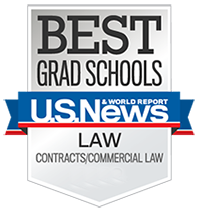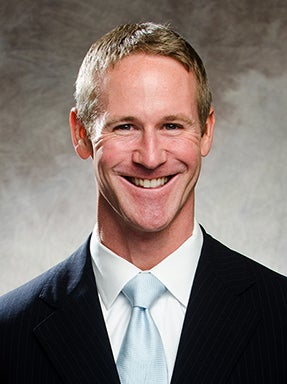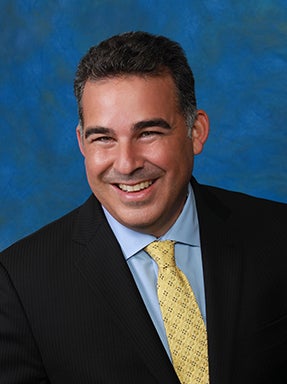Corporate and Commercial Law
The Corporate & Commercial Law Program is designed to prepare Denver Law students with knowledge, insight, perspective and skills required to practice effectively in the areas of corporate law, commercial law and bankruptcy and business litigation. A rigorous second-year curriculum and experiential and critical-thinking courses in the third year (fourth year for part-time students) provide our graduates with a running start as they begin their careers practicing business law.
Jan. 2023: Denver Law 3L Ryann Connell wins Baylor Law's The Closer transactional competition. Read more
Here are some frequent questions about the Corporate & Commercial Law Program.
-
When should I take certain classes in order to meet the certificate requirements?
We suggest that you tackle the core requirements during the fall and spring semesters of your 2L year. These classes are generally larger in size and can be easier to get into as a 2L.
In particular, we highly recommend you take Corporations during your fall semester 2L year. This is a great foundational course, in general, and for many of the other classes that are part of the certificate program.
In addition, you should strongly consider taking the remaining core requirements during your fall and spring 2L year (fall and spring 2L and fall 3L semesters for the weekend professional students): Secured Transactions, Accounting for Lawyers, and one of the courses listed in the category 2 requirement (Bankruptcy, Securities Law, or Trial Practice). It is highly recommended that you take Secured Transactions prior to taking Bankruptcy.
We suggest taking your CCLP approved writing course in the spring semester of your 2L year or fall semester of your 3L year (spring 2L and fall and spring 3L semesters for the weekend professional students). As many of the CCLP writing courses have a capped class size it can be easier to get into these courses as a second semester 2L or 3L student.
We suggest taking your critical thinking seminar in the spring semester of your 2L year or during your 3L year (fall or spring semesters of your 3L or 4L year for weekend professional students).
It is generally best to meet your corporate and commercial oriented externship requirement during your 2L or 3L year (2L, 3L, or 4L year for weekend professional students). Both unpaid and paid externship experiences can count, as can a paid clerkship experience. In the circumstance where you use an externship experience that was not for credit, you will need to take an additional business law course to fulfill those credit hours. If you are concerned whether an experience meets the externship requirement, contact the Faculty Director.
We suggest taking your additional business law course at any time during your 2L and 3L year (2L, 3L, and 4L year for weekend professional students). Be on the lookout for the course that is of most interest to you and register when it is on the class schedule. -
Do I still have to take Accounting for Lawyers if I have taken accounting courses as part of my undergraduate or other graduate degree?
The answer to that is, that it depends. In order to be waived out of Accounting for Lawyers, you must contact the Faculty Director and provide information regarding the accounting oriented classes you have previously taken, including a description of the content and the number of credit hours. The decision to waive this requirement is made on a case-by-case basis. In the circumstance where the Faculty Director waives this requirement, you will be required to take another 3 credit business law course in lieu of the Accounting for Lawyers requirement.
-
What classes should I take if I have a particular practice area interest?
The CCLP certificate was designed to build a strong foundation for law students who are interested in practicing corporate and commercial law, whether as a transactional lawyer or a litigator. However, you may be interested in supplementing the requirements based on a particular practice area. If that is the case, we have provided some general suggestions regarding additional courses you might take based on a particular area of law.
Interested in being a general transactional lawyer:
Securities Law (as your category 2 requirement); Agency, Partnership & LLCs or Corporate Transactions Practicum (as your CTS requirement); Business & Commercial Law Seminar, Contracts Drafting, or Corporate Drafting (as your CCLP Writing requirement); Bankruptcy; Basic Tax; Business & Commercial Law Seminar; Employment Law Survey; Taxation of Business Entities; and Transactional Negotiations.
Interested in being a securities lawyer:
Securities Law (as your category 2 requirement); Corporate Transactions Practicum, Private Equity Seminar, or Securities Law Seminar & Practicum (as your CTS requirement); Business & Commercial Law Seminar, Corporate Drafting, or Private Equity Seminar (as your CCLP Writing requirement); Asset Management Regulation; Introduction to the Regulation of Cryptoassets; Representing Clients Before the SEC; Transactional Negotiations; and Venture Law.
Interested in being a mergers & acquisitions lawyer:
Securities Law (as your category 2 requirement); Agency, Partnerships & LLCs, Antitrust and Unfair Competitions, Corporate Transactions Practicum, or Transactional Negotiations (as your CTS requirement); Contracts Drafting or Corporate Drafting (as your CCLP Writing requirement); Antitrust and Unfair Competitions; Employment Law Survey; International Business Transactions; and Mergers & Acquisitions.
Interested in working with start-ups:
Securities Law (as your category 2 requirement); Agency, Partnerships & LLCs, Corporate Transactions Practicum, Private Equity Seminar, Transactional Negotiations, or Venture Law (as your CTS requirement); Contracts Drafting, Corporate Drafting, or Private Equity Seminar (as your CCLP Writing requirement); Employment Law Survey; Introduction to Intellectual Property; Introduction to the Regulation of Cryptoassets; Mergers & Acquisitions; Privacy Law; and Trademark Law.
Interested in being a general commercial litigator:
Bankruptcy Law or Trial Practice (as your category 2 requirement); Antitrust and Unfair Competitions, International Commercial Arbitration, Negotiation and Mediation, or Securities Law Seminar & Practicum (as your CTS requirement); Contracts Drafting or Corporate Drafting (as your CCLP Writing requirement); Antitrust and Unfair Competitions; Compliance; Cybersecurity, Data Privacy & Incident Response Practicum; Employment Discrimination Law; Insurance Money & Litigation Bootcamp; Labor Law; Privacy Law; Representing Clients Before the SEC; and White Collar Crime.
Interested in being a bankruptcy lawyer:
Bankruptcy Law (as your category 2 requirement); Antitrust and Unfair Competitions, Negotiation and Mediation, or Securities Law Seminar & Practicum (as your CTS requirement); Contracts Drafting or Corporate Drafting (as your CCLP Writing requirement); Antitrust and Unfair Competitions; Basic Tax; Employment Discrimination law; Environmental Law; Family Law; Real Estate; and Securities Law. -
How many credits is the Corporate and Commercial Law Certificate?
In order to meet the certificate requirements you must complete a minimum of 26 credit hours of courses and/or externships that are corporate and commercial oriented. Depending on the credit hours of the courses you complete and whether your externship is for or not for credit, it may impact the total credit hours you have completed after meeting the listed certificate requirements. If you complete all of the requirements and have not reached the 26 credit hour minimum, you must take additional corporate and commercial law courses to meet the required credit hour minimum. If you have not completed the 26 credit hour minimum requirement, you will not receive the certificate.
-
What student organizations and activities should I consider getting involved with to supplement my corporate and commercial law interest?
There are so many great student organizations you can get involved in at the law school. With that said, some of the ones you might consider if your interest is in corporate and commercial law include the following: Business Law Society, Pioneer Venture Group (cross-disciplinary group), Privacy Law Society, The Race to the Bottom Blog, and Venture Law Society.
You should also be on the lookout for various student competition opportunities. The CCLP often hosts an intraschool negotiation competition each academic year (The Closer Intraschool Competition) and sometimes hosts a transactional competition (Transactional LawMeets). Additionally, when invited, the CCLP sends a student to participate in Baylor Law’s national The Closer competition. Additionally, two adjunct professors field a team of law students at the Duberstein Bankruptcy Moot Court Competition each year. Finally, if you learn of a competition event that you would like to participate in, reach out to the Faculty Director to discuss the opportunity. -
What can I do to connect to the Denver area corporate and commercial law community?
Denver has a strong legal community with many Denver Law Alums practicing in the area. There are a wide variety of opportunities to make connections with local lawyers and a few are listed below.
First and foremost, you should become a student member of the Colorado Bar Association (it’s free for students) and join the most relevant section such as the Business Law (free for students), Litigation, Real Estate Law, or Taxation Law. There are also a number of Business Law subsections that might be of interest including the Bankruptcy Subsection, Business Entities Subsection, Financial Institutions Subsection, Mergers & Acquisitions Subsection, Privately Held Businesses Subsection, and Securities Subsection. Then take the next step and participate in the various events that these organizations hold. Each CCLP Newsletter contains a list of upcoming CLEs that you can attend and where you can network and you can also find those on the Colorado Bar Association’s website.
Consider writing an article for the Colorado Bar Association’s Business Law Section’s online newsletter – the newsletter editor is always looking for law student contributors to write short “nuts and bolts” type articles.
Consider reaching out to a Denver Law alum and scheduling a time to meet up.
Attend the various opportunities that the law school provides to meet local lawyers, whether through the Career Development Office, student organizations, certificate programs, and more.
Get to know your professors as they have strong ties to the local legal community and know a lot of Denver Law alumni.










